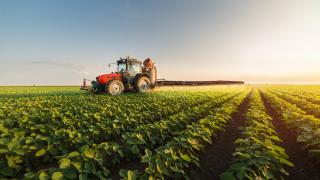
The manufacturing industry has been in a state of gradual transformation for quite some time now, due to the arrival of automation and the Fourth Industrial Revolution. Compounded with the effects of Brexit and the COVID-19 pandemic, these changes have leaked into many of the vertical markets that engineering & manufacturing serves.
Agriculture - arguably the UK's 'bread and butter' industry - is in no way exempt from the market conditions and advancements in technology seen within recent years. In fact, these factors could be coming together to create a huge realignment in how the industry operates, as well as the demand for UK-grown produce.
Market Conditions & Agriculture:
There is no denying that the events of 2020 did not prove favourable to the UK's agriculture industry. The Department for Environmental and Rural affairs reported that the total income from UK farming fell by 15.7% last year - an astounding £676million less than 2019. This decline is thought to be due to a pronounced fall in crop output, compounded by the national lockdowns implemented as a result of the COVID-19 pandemic. The total income for 2021 remains to be seen; however, this year also brings about a new set of challenges in the form of Brexit, which saw the UK leave the EU in January.
Brexit has meant that the UK will need to rely more upon its own produce.
Brexit provides UK farmers with something of a double-edged sword. On one hand, there will be novel dilemmas in finding seasonal staff to assist with harvesting, as well as various exporting headaches; on the other, Brexit has meant that the UK will need to rely more upon its own produce, which could potentially spell a huge influx in demand. Shipping delays have meant that perishable goods - such as fruit and vegetables - cannot be imported and exported within the allocated shelf life of the produce, resulting in more of a reliance upon our own national agricultural efforts.
The shipping challenges brought about by Brexit were always going to be problematic, but the unfortunate timing of the COVID-19 pandemic has compounded these issues much further. International freight has been crippled by restrictions, further inhibiting the import and export of goods worldwide. This has only added to the increase in demand for locally-sourced produce.
READ: How Will Brexit Affect Subcontract Sourcing?
UK Agriculture & the Environment:
As the world comes to terms with climate change and implements measures to become more environmentally-friendly, UK agriculture is also likely to evolve further still. It cannot be disputed that food packaging is becoming more and more of a hot topic - especially when it comes to the use of plastics.
With much of the produce we see in supermarkets needlessly packaged, it's only so long before the plastic bubble bursts as we become more aware of the impact that the use of non-recyclable plastics has upon the environment. If plastic wrapping of fruits and vegetables is done away with, then the exportability of produce will fall further still - not to mention the reduction of the UK's carbon footprint if a majority of our food was homegrown.
Food packaging is becoming more and more of a hot topic - especially when it comes to the use of plastics.
This increasing focus on sustainability could see us return to a more traditional way of food shopping using grocers and butchers, which would facilitate a huge reduction in the amount of plastic wastage. The rise of artisan food stores in recent times perhaps serves as evidence for a shift towards the food shopping habits of old, which would only further reinforce the strength of the UK's agriculture sector.
READ: Engineering a More Sustainable Future
UK Agriculture & Automation:
The rise of automation has spread much further than manufacturing alone, with all manner of industries now enjoying a more efficient manner of working. Automation is also becoming more prominent within the agriculture sector, which could help to offset the reduction in seasonal workers as a result of Brexit. During the 2020 national lockdowns, we experienced a flavour of the difficulties in harvesting that we face without an abundance of seasonal workers; now these issues have unfortunately taken on a more permanent form.
Automation is becoming more prominent within the agriculture sector.
Automated agricultural equipment is on the rise, decreasing the amount of manpower required within the agricultural landscape. As these technologies continue to develop, everyday tasks can become less labour-intensive, which would help to bridge the personnel gap created by Brexit. Crop-spraying drones, autonomous tractors and weeding robots are all examples of automated agricultural machinery that is currently in the works - when you consider how much farming has changed since the invention of the combine harvester, it's not hard to imagine the impacts of what the future has in store!
READ: Is Automation the Best Way To Close the Skills Gap?
What's Next For UK Agriculture?
Due to the ever-shifting nature of the political and economic stages within the world at large - especially as we continue to navigate our way through unknown territory in the form of the global pandemic and Brexit - it's impossible to say with certainty how the UK's industries will fare long-term. However, the agriculture sector is likely to experience something of a boom in line with global freight disruptions and spiralling import/export tariffs, making us more reliant than ever on nationally-sourced produce.
It makes sense to utilise our own resources as much as possible.
Although we are now cautiously coming out of the other side of the COVID-19 pandemic, Brexit and the environmental focus are here to stay. Therefore, the appeal of national agriculture will probably remain long after we throw out our face masks - it simply makes sense to utilise our own resources as much as possible. Automation will allow UK farmers to operate more efficiently - however, only time will tell whether this is enough to bridge the employment gap left behind in the wake of Brexit.
